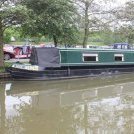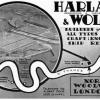Leaderboard
Popular Content
Showing content with the highest reputation on 15/10/17 in all areas
-
Well I ought not to have spent the time, but herewith my own hasty synopsis of the relevant Acts affecting PRN & pleasure boat charges on the Bridgewater Canal. Question marks denote legislation I do not have copies of. 1759 Bridgewater Canal Act s.29 - 2 interpretations possible respecting PRN: no mention of pleasure boats, but ambiguity could potentially support use of any boat at all. 1760 Bridgewater Canal Act ? 1762 Bridgewater Canal Act ? 1766 Bridgewater Canal Act Riparian owner/occupiers to have free use of pleasure boats without charge, so long as no lock passage without consent. Note: if riparians granted free use of pleasure boats, implication is that others have not been; but see erivers post re GJCC Act 1793 [& my response] 1794 Bridgewater Canal Act s.73 Riparian boats may pass locks if either: a) consent of company, or b ) pay tonnage equal to 6 tons. Note: combining this section with previous, would suggest that ‘consent’ in 1766 was an ex-gratia one, and that henceforward an alternative to such consent was payment of a fixed charge. It might seem from this that even if consent for something was needed from the company, they were free to give or refuse that consent, but not on the basis of charging for that consent – perhaps. 1795 Bridgewater Canal Act ? 1847 Harbour Clauses Act ? 1870 Bridgewater Rules - nothing relevant 1885 Manchester Shipping Canal Act Interpretation: “vessels” includes “craft of every class & description however propelled.” s.62 provides that any riparian owner/occupier may construct wharves, landing places, side basins and lay-byes with suitable access to the canal, free of wharfage rates. s.128 provides that the company may demand dues in respect of every vessel specified in 3rd schedule to the Act on entering or leaving the canal [relating only to commercial craft]. s.129 provides for charges for carriage of both passengers & cargo s.130 provides that “light or empty vessels shall be at liberty to pass one way between the extreme points before mentioned or any intermediate places toll free.” s.138 provides that charges may be made for any vessel using the ‘communications’ to be built at Barton, unless repairs interrupt passage. s.139 provides that use of the canal for conveying fertiliser for field within a mile of the canal is free. s.149 provides that the company may licence lighters s.196/7 provide that the company may licence steam powered tugs for towing s.196 added byelaw powers – for regulating use of wharves, landing places, quays, basins and lay byes, but not private ones; for regulating speed limits of steam-powered vessels of all sorts; for regulating the T&C’s and charges for the grant of any licences as aforementioned; s.213 provides that unless expressly provided in this 1885 Act, nothing is to extend to prejudicially affect the provisions of the Bridgewater & etc Canal Acts Note: there are 2 classes of commercial vessel that they get power to licence here [which is later extended to other classes] but not including pleasure boats. 1886 MSC Act 1887 MSC Act 1888 MSC (additional lands) Act 1888 MSC (alteration of works) Act 1888 Railway and Canal Traffic Act - qualifies MSC under Transport Act 1962 s.52. 1890 MSC (tidal openings & etc) Act 1890 MSC Act - s.19 extension of Byelaw powers – nothing relevant 1891 MSC Act - nothing relevant 1893 MSC Act - nothing relevant 1893 Manchester Corporation (ship canal) Act - nothing relevant 1893 MSC (additional capital) Act - nothing relevant 1893 MSC (surplus lands) Act - nothing relevant 1894 MSC Act - nothing relevant 1894 Canal Rates Bridgewater & etc Act General Schedule applicable to all listed canals s.7(viii) expressly excludes charges for the boat occupation of any private wharf on the canal, in any private lay-by or in any private canal basin. Also provides for free overnight mooring at any Company berth, and for any reasonable time when not at work [providing no impediment to navigation or the facility]. Amended later in 1960. s.25 provides that “nothing in this schedule shall apply to pleasure boats or affect the tolls or charges (if any) which the Company are authorised to make in respect of such boats under the provisions of any Act of Parliament”. Note: the company were authorised by the 1794 Act to charge for pleasure boats to pass through a lock Special section Applicable Only to the Bridgewater Canals s.(i) provides that any empty boat passing through one or more locks, or entering the canal from another navigation, may be charged 5 shillings [unless on a return passage having paid toll on cargo carried Note 1: on its own, this could be interpreted as applying to any pleasure boat - which will fit the definition of an empty boat so far as carriage of cargo is concerned. The query would arise: does the special section come under the s.25 exemption of the general section? It seems to me that it must, but it is possibly arguable, demanding more attention. IF it could be said to apply to pleasure boats, then a charge for entering or leaving the canal from or to an adjoining navigation is authorised. It would not affect the freedoms of riparian boats, so long as they remained at private berths, and when leaving those to navigate did not either use a lock or leave the canal. Note 2: – on reading the 1960 Act, it is apparent that the special section did not include pleasure boats, hence the remedy of the additional clause; it DOES now include them. 1896 MSC Act - extension of byelaw powers for Bridgewater – nothing relevant 1897 MSC Act - nothing relevant 1900 MSC Act - nothing relevant 1904 (finances) Act - nothing relevant 1907 (various powers) Act - nothing relevant 1907 MSC (Bridgewater) Act – nothing relevant 1911 MSC Act - nothing relevant 1912 MSC Act - nothing relevant 1913 MSC Act - nothing relevant 1919 MSC Act - nothing relevant 1920 MSC Act - increase of Bridgewater rates; nothing relevant 1924 MSC Act - nothing relevant 1925 MSC Act - nothing relevant 1926 MSC (general powers) Act - nothing relevant 1926 MSC (staff superannuation) Act - nothing relevant 1928 MSC Act - nothing relevant 1933 MSC Act - nothing relevant 1936 MSC Act - s.32 removal of sunk stranded or abandoned vessels – not relevant 1945 MSC Act - nothing relevant 1947 Transport Act - nothing relevant 1949 MSC Act - nothing relevant 1950 MSC Act s.18 increased Bridgewater rates; s.25 abandonment of Bridgewater lock; undertakings re: other locks [repealed 1975] 1952 MSC Act - increased Bridgewater rates - no longer relevant 1954 Transport Charges &etc (miscellaneous provisions) Act – applied national charges schemes to private undertakings – nothing relevant – abolished in 1962 1956 MSC Act - ? 1960 MSC Act s.3 - application of Harbour Clauses Act 1847 – not relevant s.4 – additional canal tolls s.6 – company can charge any boat at all that remains in Runcorn Dock, and for use & occupation of any berth in Runcorn Docks s.6( b ) – extends definition of vessel in special section of the 1894 Rates Act applicable to Bridgewater, to embrace every type of craft, however propelled [hence pleasure boats]. Hence the entry & exit toll now applied to pleasure boats. s.9 – powers of removal of Bridgewater boats left therein without consent Note: consent not required for boats at private property/moorings, but is required for longer than overnight on company premises &/or towpath, for lock passage if not paid for, & for entering and exiting the canal. Schedule 3 – articles to be carried by pleasure craft in the harbour 1962 MSC Act - nothing relevant 1962 Transport Act - applies s.43(1)( b ) (2) (3) (5) & (6) to the charges of the Bridgewater 1966 MSC Act - nothing relevant 1970 MSC Revision Order - extension of byelaw powers 1975 MSC Revision Order - nothing relevant 1976 MSC (black bear canal) Act - abolished PRN, but nothing relevant to Bridgewater Note: I have not seen the original Act for the waterway affected; if couched in the same terms as the Bridgewater, might affect the interpretation of PRN there. 1983 MSC Revision Order - nothing relevant 1984 MSC Revision Order - nothing relevant 1987 MSC Revision Order - nothing relevant 1990 MSC Revision Order - nothing relevant 1992 MSC Revision Order - nothing relevant 2012 Bridgewater Canal (Transfer of Undertakings) Order s.4 - affirms existing byelaws, extends byelaw making powers to include registration, T&C’s etc, subject to a penalty not exceeding level 3 on the standard scale. s.7 – affirms power to make reasonable charges, though that subject - s.7( c ) - to any prior enactment which “expressly or impliedly provides for freedom from charges or otherwise prohibits the making of any charge.” Note: that last respecting “reasonable” is odd, given the TA 1962 which had specifically removed the need for reasonableness in charges – maybe government were having a change of heart? Apart from the missing Acts, there will be sections bearing on consent for berthing at private premises which I have skimmed over and which I don’t feel like going back to look for at the moment. So far as PRN is concerned, it is now irrelevant, given Parliamentary sanction for transit charges to be levied has been discovered.3 points
-
Cart have a current committee trying to come up with a no defecating horse sign for hawksbury. They will have several consultations and a few meetings. By the time they have finished the horses will be able to reach the off towpath vegitation load and a new green solution to the problem will be established. hopefuly the licence checkers will be tasked with collecting the result and will sell it via crt auction to the highest bidder so those who insist on covering their boat with floral arrangements to inhibit navigation can add crap to the crap. . I was doing the engine check there last year and stood up to a horses head peering in the engine room. It muttered something about 18 horse power and stealing their jobs.3 points
-
Helped them down glasc.ote Very tidy work by some bloke called Kedian...2 points
-
Stop giving consideration, and report it. I know that there is always the nagging doubt that says "we avoided catastrophe, and I don't want to get anybody into trouble", but put it aside. "Never Events" should always be reported, and a near miss like this due to a failure to operate in accordance with protocol is a "never event" Whilst THAT lockie will have learned a valuable lesson about complacency, the fact that he was complacent suggests that others may be too, and they didn't have the brown trouser moment to teach them. Reporting it allows CRT to send a notice out about the near miss to counteract any complacency that is out there. There is also the need to ensure that if this lockie has a history of mistakes, they know about the latest one. Has he had previous errors and not learned from them2 points
-
You don't make money unless you get out of UK house ownership though. You merely keep pace with house inflation (which unlike RPI most people don't see as a bad thing). The conventional wisdom is to work hard at school, get good grades, get a good job, buy a house, pay into a pension scheme and enjoy retirement. That has worked well right up until my parents generation really. Then came the 80's Thatcher/Reagan, big bang in the city, red braces, VW GTI etc, etc. The new share owning democracy demanded an unrealistic return on money, so now we had to pay for University, couldn't afford final pay pension schemes, had to retire later, had to fund elderly care ourselves etc, etc. No matter how affluent the masses become the top 2% know how to stay the top 2% and it only includes most of us as a vehicle to keep them there. I am 60. Have owned and sold 5 houses, rented countless more and still own 1 narrowboat. I currently rent a house. I funded 2 kids through Uni, am having to work until I am 66 to fund retirement and don't have a single regret. The houses I have owned haven't really made me a penny. The houses that I have rented are a cost of living (like a gas bill). The cost of children is the responsibility of being a parent. The high cost of boat ownership is a discretionary spend that is giving me immense pleasure and a hobby. The O/P will have to make his own mind up but generally I would advise NO. Based on the fact that he has had to ask the question. He seems to be in the buying a house is a good thing to do camp (I have no views). Without doubt the cost of boat ownership (and depreciation) will nibble away at his inheritance. No one can forecast the future but the 2% vested interests do not see any advantage in allowing house prices to fall.2 points
-
Wouldn't it be nice if people thought of bricks/mortar/flats/houses etc as homes instead of a way of making money?2 points
-
1 point
-
I must post the comment that gigoguy is to be congratulated on provoking an interesting debate and provoking research that would otherwise never have been undertaken. It is always wrong, as Hildyard J commented in my own case, that the public should have to wade through a 'morass' of legislation to determine their rights, where even the company's legal department are unable to come up with straight and accurate answers, such that the public is forced to rely on the authority's "say so". It says little for the quality and/or probity of Peel's legal department that they either could not or would not give a straight answer to a straight question. It could have been true or false, but certainly the true grounds for the charge are not where they claimed it to be.1 point
-
I don't quite see it it that way. All the OP has sought according to his postings, has been clarification of what the legal position truly is, and has objected fiercely to the public relying on mere say-so from the authority. Admittedly, in the absence of clear direction from their legal department, he has been somewhat precipitate and disproportionate in his visceral response to their obfuscation, but it takes people with passion for justice and with conviction to force things into the open - and whether the result is what one might have desired or not, it is desirable to achieve a result. Nearly 2 and a half centuries of applicable legislation containing several different private company Acts as well as relevant public Acts to sort through, and their own lawyers cannot come up with a straightforward answer to a simple yet cogent question as to why they do what they do? It brings to mind the comment by Hildyard J regarding the 'morass' of BW legislation - it cannot be right that the public should have to rely on BW's say-so as to what they are entitled to do. Same applies here.1 point
-
1 point
-
I can't see it being a problem. First bump will bend the cabin, next will tear the wheel off Richard1 point
-
I suspect you will end up damaging your boat and / or the actual structure of the tunnels. The tunnel walls are all uneven and have suspect brick work in places, this surely will catch or break off if in contact with these wheels.1 point
-
1 point
-
This post cannot be displayed because it is in a forum which requires at least 10 posts to view.
-
1 point
-
Reminds me of when I first started work. As we looked after several buildings, you will to the one where your first job was and phoned in to a central point from there. I was working with a colleague called Dave. He phoned in and said "Hhhhi, it it it its Dddd, Dddd, Dddd" Whereupon the person on the other end of the phone said "Hi Dave, I'll book you in". Dave's response was priceless... "Hhhhow dd dd did you know it it was me"1 point
-
Oh well. You should have hired a traditional wooden sailing cruiser from Martham. What you ain't got you don't miss.1 point
-
Artisan approach! There's a lot of that on the cut. I would imagine the water pump on any automotive engine will be more than up to the job of moving coolant past the baffles in the pictured skin tank, the car radiator is crammed full of them.1 point
-
1 point
-
Just seen Tichitoro go past, with Mr & Mrs RatKatcher on board and two small dogs on the roof. She looks very smart.1 point
-
Hello Mike and welcome to the forum. The canal boating world at the moment is in a right state, with any old carp fetching decent money and boatyards and brokers falling over themselves to buy up stock because everyone seems to want a narrowboat at the moment. It may be this is an upward trend that is going to continue for several years, or it could be the bubble is about to burst. Whichever view you subscribe to, anyone who tries to tell you what a boat might be worth next year, let alone in ten years, is a fool. So forget about the money. You simply have to decide, as others have suggested, what in life is most important to you. We all have dreams, many of them never become reality because we have a good think about it and realise that it's just not practical, or perhaps whatever we thought we wanted, we didn't actually want it badly enough. I'd suggest the fact that you're raising issues on this forum suggests you're not sure in your own mind whether you really do want to do this. A lot of folk at the moment are watching these stupid programmes on TV and getting a very distorted view of what canal boating, and in particular owning a boat, is really like. I'm not suggesting for one moment that you are one of these but at the same time you also need to sit back and think about what a lot of money you are proposing to throw at a potential trouble machine. What you get with an expensive boat is maybe a longer life span and more refinement but all boats go wrong and cost money. In fact I'd say there's potential for an expensive boat to cost more to run than a cheap one. Also the moorings issue is very real and potentially expensive where you propose to live. Personally - I wanted to buy a boat to live on 30 years ago, I knew someone who lived on one and it seemed the height of romance to me. But I also wanted to make sure I was financially secure when I retired. Had I bought the boat I might have more friends and be more of an interesting person... but I very much like the life I have these days so I think I made the right decision. Good luck to you whatever you decide.1 point
-
I'm not talking about it being an investment financially. More an investment in your life. We all put to much time into having to do this and that, pleasing others all the time. When we should stop and think more about the ones around us and have a better quality of life getting work/ life balance right. Its not all about bricks and mortar.1 point
-
And far more than one (your boat) work perfectly well with two or more baffles, in some case vertical so that should be good enough for you also, but it appears it isn't? According to your original posts an extra baffler would cause overheating on the grounds the engine water pump would not be powerful enough to overcome the extra resistance to flow. As Engines Plus have in the past and may still supplied the majority of new hireboat engines any that followed the mariniser's advice would be overheating according to you. They are patently not, even the ones that were allowed to do the London and Thames rings. This indicates that either the builders ignored Engines Plus's advice or your conclusions about baffles and resistance are wrong. I leave it to other readers to decide which is likely to be closer to the truth. It is my view that you have a tendency to read something, do it, and if it works take what you read as 100% correct. That's fine for you but when you then try to use that limited experience to advise others then, again in my view, you are in the wrong. No one has a problem with the Beta design because it will work but it may be sub optimal. I could reply in the same way and say if you have a problem with the Engines Plus design take it up with them but my experience tells me its a pointless remark to make. I do have a major problem when you mislead other people (in my view), criticise very experienced and well regarded people and then try to justify your conduct by quoting a single internet source. That is not good enough for me.1 point
-
Dear Black Rose being as you state most people haven’t heard of me prior to this forum perhaps you might like a potted history of my work life In 1967 I started working for Kearney and Treacker in Brighton and did a four year apprenticeship as a Fabricator welder passsing EITB courses with credits and City and Guilds fabricaton and welding courses with credit I moved to Northampton for personal reasons in 1973 and was offered a position with Hancock and Lane in Daventry and began a further apprenticeship in steel boat building I worked up through the ranks to become a leading hand I have built boats for notable companies ie Peter Nicholls yacht builders. G &J Reeves Probuild narrow boats and Steelcraft during this time I have been involved in the construction of over 100 boats I decided that I would like to finish by running my own company Kedian Engineering I bring over 45 yers of experience to this forum and am happy to share that if asked Thank you for your interest in my journey and for your comments on this forum which I take on board and read with interest Martin1 point
-
One of the more useful articles that has turned up on the 'Dark Side': Registering with a doctor as a continuous cruiser PUBLISHED: WEDNESDAY, 04 OCTOBER 2017 THERE should be no problem with registering with a doctor as a continuous cruiser. But often there is, as I found out some time ago, writes Keith Gudgin. I found there is no valid legal reason why a doctors surgery can refuse to register you just because you do not have a permanent address or, more annoyingly, one of those stupid postcodes. All in the document The details are all in an NHS document called: 'Who pays? Determining responsibility for payments to providers: Rules and guidance for clinical commissioning groups’ published by NHS England. A pdf copy of this document can be found here: https://www.england.nhs.uk/wp-content/uploads/2014/05/who-pays.pdf When I was trying to register with a doctor I was given all types of excuses why I could not from not being resident in their area to being too old or requiring too much treatment. Refused a registration This is the letter I received from a Mr Peter Hawkins at the Department of Health when I complained to the parliamentary office after I was refused a registration: The text of his reply is copied at the end of this article which in it states ‘the absence of a permanent address is not a barrier for a person with ‘no fixed abode’ to registering with a GP practice. I also complained to NHS England highlighting the points made in this letter. I am now registered with a doctors' surgery and my registered address is the surgery address and has been since 2013. Don't be fobbed-off Don't let the surgery fob you off. They have no right to refuse you. If you encounter problems registering with a GP or obtaining treatment, contact the clinical commissioning group (CCG) responsible for commissioning health services in that local area. Contact details can be obtained from the GP surgery or on the NHS Choices website at: http://www.nhs.uk/Service-Search/Clinical%20Commissioning%20Group/LocationSearch/1 If you don't get satisfaction then complain to NHS England here: https://www.england.nhs.uk/contact-us/complaint/complaining-to-nhse/ And also complain to your MP here: http://www.parliament.uk/get-involved/contact-your-mp/ after all you are entitled to a doctor. Complaining worked Complaining worked for me, in less than 24 hours after I sent an email complaint to NHS England I had an email from the doctors surgery stating I was being registered with them and my registered address would be the surgery address. They now send all correspondence to me via email. You don't even need to keep going back to them for prescriptions if you are on regular repeat medication. You can get your repeat prescriptions anywhere in England by using the electronic prescription service (EPS). A chemist near you All you need to do is go into a chemist near where you are moored and get them to register you on the system. Get their details i.e. address and EPS code and send it, I use email, to your doctors surgery asking them to put your repeat prescription on the EPS using the details you have sent them. Leave it a couple of days to be done then you can collect your medication from the chemist. Don't worry about moving to a new area and needing a new prescription as you can re-register at another chemist at any time, just make sure your surgery knows the new chemists details when you ask for your repeat prescription. I've been doing this for some time and it works fine. It's also best if you get your doctor to issue you with three months worth of medication at a time then you don't have to re-register too often. The letter from the Department of Heath Here is the text of the letter I recieved in 2013 from Peter Hawkins at the Department of Health: Thank you for your email of 4 October about registering with a GP. I have been asked to reply. The document ‘Who pays? Determining responsibility for payments to providers: Rules and guidance for clinical commissioning groups’ published by NHS England states that ‘the absence of a permanent address is not a barrier for a person with ‘no fixed abode’ to registering with a GP practice. In many instances, practices have used the practice address in order to register a homeless person’. While the guidance does not specifically mention people who cruise on the canals in the UK, it does cover the general term of people with ‘no fixed abode’. In addition, if a person wants to see a GP and is visiting an area for more than 24 hours but less than three months, they can apply to register with a GP surgery as a temporary resident. The application can be made using form GMS3, which can be requested from the GP surgery. A person can register temporarily with a practice near where they are currently staying and still remain a patient of their registered practice. Furthermore, if a person is ill while away from home or if they are not registered with a GP practice but they need to see one, they can still contact their nearest practice to ask for treatment. People are entitled to receive emergency treatment for 14 days. After that they will be required to register as a temporary resident or permanent patient. Finally, people can also visit a NHS walk-in centre or minor injuries unit. If people encounter problems registering with a GP or obtaining treatment, concerns should be directed to the clinical commissioning group (CCG) responsible for commissioning health services in that local area. Contact details for CCGs can be obtained from the GP surgery or on the NHS Choices website at: http://www.nhs.uk/Service-Search/Clinical Commissioning Group/LocationSearch/1 (enter the postcode of the GP practice, or temporary residence in the search field and follow the links). I hope this reply is helpful. Yours sincerely, Peter Hawkins Ministerial Correspondence and Public Enquiries Department of Health1 point
This leaderboard is set to London/GMT+01:00

















